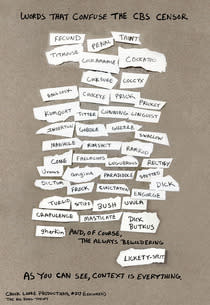Exclusive: Chuck Lorre Unveils Censored Vanity Cards for His New Book

When Chuck Lorre created Dharma & Greg in 1997, he (like all showrunners) was given a second at the end of each episode to flash a vanity card — usually a logo of the writer's production company. But Lorre decided to use the time to quietly run an essay about interference from the network.
It was the age before DVRs, so few noticed. Lorre kept on writing new ones, week after week, and slowly viewers began to hit pause on their VCRs to make out the tiny words. Lorre says the cards eventually "turned into a diatribe about the silly things I believe in. It has been a great opportunity to try and write something that isn't a script."
Now, Lorre writes three a week for CBS's Two and a Half Men, The Big Bang Theory and Mike and Molly, and the vanity cards are dissected by millions of viewers — and plenty of network lawyers. "Blame TiVo," Lorre says. "Prior to that it was very difficult to read them. VCRs couldn't catch them well. I got into a lot of trouble once people started reading them. For every vanity card I've written for the last four or five years there's probably 10 sets of lawyer eyeballs on each one. It's an interesting process to even make them now, there's no much scrutiny."
Several cards have been censored by the network over the years, but now Lorre has collected his favorites, including some of those banned ones, into the coffee table book What Doesn't Kill Us, Makes Us Bitter, which Simon & Schuster will release on October 30. Lorre has made his vanity cards available online for years and had been approached several times about publishing them in a book. "I hesitated because I didn't really see the value in solidifying something that was already readily available," he says. "Then we hit upon the idea of adding original artwork and making it a coffee table book. That sounded like something that added some value."
Priced at $100, proceeds will go to Lorre's Dharma-Grace Foundation, which supports the Venice (Calif.) Family Clinic. "I really liked their mission, to provide medical care to people regardless of their ability to pay for it," says Lorre, who remembers being sick without health insurance in his 20s. "A large percentage of people who walk in the door have jobs, they just don't have medical insurance. It was a personal issue for me."
Lorre combed through countless vanity cards to choose his favorites and admits he was stunned by some of the ones he hadn't read in years. "I was surprised to see how seemingly open I was to sharing my thoughts and experiences," he says. "I didn't have a good censor at the time, I was just sort of spilling it all out. I probably should have used that time to see a therapist or something."
The writer, who just signed a new mega deal at Warner Bros. TV to expand his company (and venture into dramas and features), compares his vanity cards to the liner notes that used to be found on record album sleeves. "I don't want them to hurt the shows, to distract from the shows," he says. "They should be a dollop of sour cream on your scrambled eggs, not the scrambled eggs themselves. I don't like sour cream on scrambled eggs, I don't know why I used that analogy."
Among the vanity cards that have been heavily publicized were several with references to Charlie Sheen's troubles, including one in February 2011 in which Lorre detailed his own health regimen, before quipping, "If Charlie Sheen outlives me, I'm gonna be really pissed."
There have been several times over the years that network censors simply refused to air a card. One censored card wasn't even a question of inappropriate taste: It was an open letter to newly-single Viacom executive chairman Sumner Redstone, suggesting they hit the town together to find love. Another censored card referenced a lawsuit between CBS and Warner Bros. TV and, coincidentally, one included a reference to having been "both cheered and jeered by TV Guide."
This pictured card gives a taste of What Doesn't Kill Us; it includes several words that sound dirty — but aren't — that CBS nonetheless found inappropriate for air. Lorre replaced the offending card with this short message: "Tonight's vanity card is about censorship. It was censored."

